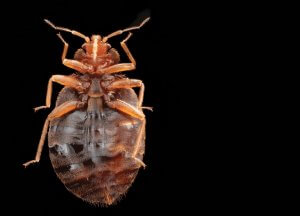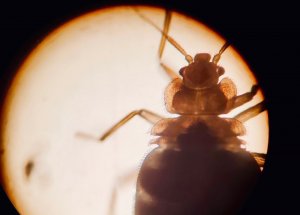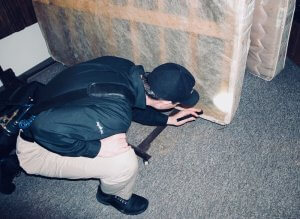Of the many insect horrors in the world, bed bugs often seem to top the list.
Unfortunately, along with cooler Fall and Winter temps comes the increased possibility that bed bugs might find their way into your home.
Unlike other pests, these annoying and often invasive critters don’t die off or hibernate, so they continue to remain active, and once they find a nice home to take up residence in, it can become a serious problem.
There are however a number of things you can do as a homeowner to protect your home and family from a bed bug infestation throughout the cooler months.
The following blog, which includes a brief history of the bed bug and how they have resurged in recent times, provides 12 simple tips to bed bug proof your home against infestations throughout Fall and Winter.
Read on or call our pest expert today – (412) 252-5200.

Bed Bugs – The Bane Of Human Civilization
Bed bugs have been the bane of human civilization since the dawn of time.
Archeological evidence dating back almost 4,000 years traces the origins of these ancient parasitic insects that feed on blood to the Middle East and caves inhabited by both humans and bats.
Barely the size of an apple seed, these hard to kill bugs can wreak havoc among hapless humans seeking only a good night’s sleep.
How to get rid of them both in summer and in winter has been a conundrum that has passed from one millennia to another down through time and up to the present day.
In the ancient world, the Egyptians used bed bugs in potions to cure common conditions and would drink them as a cure for snake-bite.
The Romans and the Greeks burned them to force leeches to release their hold.
As villages and then cities developed, these bugs thrived, spreading respectively with the burgeoning populations all throughout Asia and Europe.
The Resurgence Of Bed Bugs
The end of World War II and the introduction of DDT in the United States marked the demise of the bed bug until 1972.
At this time, the government banned the use of DDT on the grounds that it was both carcinogenic and highly toxic to animal life.
Many entomologists believe that the re-emergence of bed bugs to a not-so-adoring populace may be due to a number of factors which include: increased international travel, the popularity of second-hand furniture, the ban on DDT, a lack of public awareness and the development of a higher resistance to pesticides.

There are many ways bed bugs can spread from one location to another that have nothing at all to do with the temperature outside.
They spread easily with human travel, which translates into among other things, having college-age children who can inadvertently bring them home as unwanted holiday presents.
They climb into travel bags lay their eggs in them, and then hitchhike to a new location via a heated automobile.
Even leaving bags outside in the cold when traveling will not easily kill bed bugs because they hide inside things which protect them from the wind and cold air.
They hide, but can be found wherever they can satiate their blood lust, and this means wherever humans congregate.
This includes: private residences; apartment and office buildings; hotels (explore our bed bug prevention guide for hoteliers); train cars; airplanes and nearly any place near where people sleep or rest.
Their favorite hiding places are within the seams of mattresses, behind headboards and inside furniture.
Fall And Winter Issues With Bedbugs
A specialist should understand that bed bugs are a different kind of insect.
They live indoors and thrive on heat, which means a well-ventilated and warm home will provide all the comfort they need to survive the colder months of the year.
As such, they can be happy all year round, so long as the indoor temperature is comfortable for them.
Even if the human inhabitants of a home are away for an extended period of time, they can survive without eating for several months.
The only good take away from this is that there is usually less of a chance of a new infestation in autumn and winter, as they prefer to settle down where they feel comfortable rather than travel and seek new hosts to feed upon.
Due to the fact that during the winter, they are keeping warm inside where they share the same preferred temperature ranges as humans and are not shivering outside, bed bugs survive, although they appear to be less active during this time of the year.
In fact, winter can also serve as a boon to the nasty critters because their favored meal; namely, warm human beings, prefer to stay inside.
In addition, winter bedclothes become thicker in the winter, giving these pests more cover and opportunities to hide and reproduce.
One disturbing fact remains: bed bugs are bad news, no matter when they appear.
They reproduce quickly and are like tiny ”Houdinis” when it comes to finding all kinds of places to hide that we humans couldn’t reach even if the thought crossed our harried minds.
Alas, for they are extremely difficult to kill, and are not receptive to do it yourself treatments because most of these solutions can’t reach the many hiding spots where the bugs live when they are feeding or looking for victims to feed upon.
As a homeowner, you must contact pest-control and pest-management experts to eliminate bed bugs forever from your residence.

During the winter months, bed bug metabolism does slow down. If you permit cold temperatures in your home, you are likely to experience fewer bites, as they tend to take more time in between feedings.
If however, you maintain consistent temperatures, you wont notice any difference at all. Unfortunately, as long as they have access to a host, they won’t stop feeding just because it’s winter.
According to an article published in the Journal of Medical Entomology, bed bugs are less mobile in winter and more content to remain where they are.
In many places across North America it can be cold enough for them to die during a prolonged period of travel. Even in the face of sustainable pesticide applications by expert technicians, they will resist travel, preferring indoor quarters.
Pittsburgh, Pennsylvania and Bed Bugs
According to a recent study, the city of Pittsburgh ranked number 12 on a list of the top 20 cities infested with bed bugs in the United States.
Our teams at Pestco are unfortunately pretty busy in our home town, using their knowledge, skill and equipment to track down these critters and eradicate them with their state-of-the-art pest-control and pest-management solutions.
In fact, a few years ago, a bedbug invasion took hold after a group of high school students visiting Penn State University’s main campus returned home infested with bed bugs after a week-end science competition.
Bed bugs are very problematic within the close living quarters of multi-unit buildings, such as dormitories, because they are transitory and attach themselves to clothing or items that move from room to room.
Clothing and bed linens particularly, are easy targets for bed bugs.
According to Allegheny County medical entomologist, Bill Todaro: “The bed bug feeds on blood, and because it feeds directly on blood like a mosquito, it goes through its life cycle very quickly. In one month’s time, a female will develop from an egg to being able to lay eggs. They tend to feed between 3 and 5 am, when most people are fast asleep.”
A recent poll conducted by the National Pest Management Association (NPMA indicated that bedbugs are a serious problem for many Americans and a significant number of Pittsburgh homes, hotels and schools.
Pest control specialists, have reported almost 25% more incidents concerning bedbugs than last year.

Bed Bug Prevention Tips For Travel And Home
Many believe that bed bugs are an isolated problem within the hotel industry.
While they do invade and weak havoc in such settings, they are also very prevalent in other public areas such as: public transportation; dorm rooms, schools and universities; hospitals and nursing homes; libraries and anywhere else where people congregate.
Homeowners may inadvertently transport them into their residences inside a school or library book, back-pack, purse, dirty laundry, clothing or shopping bag.
12 Helpful Tips To Protect Your Home Against Bed Bugs
The following suggestions can help in preventing a bed bug infestation both while traveling and at home.
If one occurs in the Pittsburgh area however, do not hesitate to contact our experts at Pestco Professional Services for immediate professional help in dealing with the situation, (412) 252-5200. This is not a do-it-yourself situation.
1) Check Hotel Rooms For Signs Of Bed Bugs
The head board and box spring of a mattress are favored places for bed bugs to hide as well as couches and chairs. If you see anything, call for a different room on a different floor and move quickly. Check the new room before unpacking as well. if there’s a problem there, find another hotel before unpacking.
2) Travel with Duffel Bags Rather Than Suitcases
The advantage here is that duffel bags can be washed when you return home from your travels and suitcases cannot. Never store suitcases under the bed or in a closet. Opt instead for the basement or attic of your home.
3) Wash Everything After Returning From A Trip
Don’t just focus on the dirty stuff. According to entomologist, Jeffrey White, MS. from bedbug central.com: “Undress inside your doorway, then wash and dry all of your clothes. Frequent fliers might want to invest in the Packlite, which costs about $300. It is a portable hollow heater that surrounds an empty suitcase and kills bugs and their eggs.”
4) Use Bedbug-Proof Bags For Bedsprings and Mattresses
If you wake up with bites, buy these special bags, as they will trap both bugs and eggs. The light color of this protective cover makes bed bugs easier to see. Be sure to purchase a high quality cover that will resist tearing and check it regularly for holes. Even if you are throwing the mattress out, this will help because it will prevent bugs from falling onto a couch or another piece of furniture on their way out the front door.
Don’t stop there. If your home is in Allegheny County, call our experts at Pestco to do a full inspection and lastly, do not stop sleeping in your bed. Bedbugs are attracted to body heat and will move with you, infesting sofas and rugs and anything else they can sink their teeth into.

5) Vacuum Carpets And Rugs Often
At least once a week, vacuum the rugs and carpets in your home. If you see bedbugs, make it something you do every single day. It is also important to dispose of vacuum contents in a sealed plastic bag immediately and carefully. Failing to empty the vacuum allows trapped bugs to spread.
6) Beware of Second-Hand Goods
While it is possible that bed bugs can invade newly bought items, it is far more likely that second hand goods may be infected with bed bugs. Everyone likes a bargain, but care should be taken when purchasing second hand furniture and clothing. In the case of furniture, inspect all seams and crevices for small, reddish brown spots. Wash all clothing and dry on high heat. Lastly, never remove furniture or mattresses from the trash. Remember that someone threw them out for a reason.
7) Inspect New Clothing As Well
New clothing is not immune to bed bugs and can become infested from other shoppers or coming into contact with infested parcels during shipping. Check the seams of all clothing for red spots. Also, when trying on clothing in dressing rooms, place your own on hooks and not the seating area because bed bugs are more likely to hide in there.
8) Minimize Contact With Surfaces At Laundry Facilities
Transport items to be washed in plastic bags. Remove clothes from washer and dryer as soon as they are dry and place them in your own container. Never use folding tables or shared carts. Fold items when you get home.
9) Reduce Clutter In Your Home
Bedbugs hide among clutter and this makes it easier for them to infest your residence. Removing clutter from within eight feet of sleeping areas where these bugs can hide will help to prevent their spread.
10) Watch Out For Your Coats
Outer wear to bed bugs provides a way into another place to infest. Jackets are like handlebars on a bike as the bugs can easily grab hold and hitch a ride. Never leave your coat on someone else’s bed or couch.
11) If You Can’t Dry It, Freeze It
You obviously cannot throw items like purses, electronics and books into the clothes dryer, but you can freeze them. Freezers effectively kill bed bugs as well as heat. Wrap the item in plastic and put it in the freezer for a few hours.
12) Use Essential Oils To Repel Bed Bugs
There are several options to choose from including: cinnamon, lemongrass, clove, peppermint, lavender, thyme, tea tree and eucalyptus. Add 6 to 10 drops to a small spray bottle filled with 1/4 cup water and spray liberally on items like outerwear, handbags, totes, backpacks and luggage.
Pestco Professional Services Pest Control Solutions
The most important thing on the agenda for residents in the Pittsburgh area is a thorough bed bug inspection.
This will ferret out all the hiding places and find the source of the infestation, which is vital to any professional course of action.
Our trained technicians offer Pittsburgh home-owners a year round pest-control plan, which is both efficient and cost-effective.
In continuous operation since 1948, we are a family-run, five-star company with a stellar reputation as a leader within the pest-control and pest management industry.
Follow the tips mentioned above and/or call our team today, (412) 252-5200, to rid your home of bed bugs forever!

Photo Credits: Pixabay
 Over 300 Reviews
Over 300 Reviews 